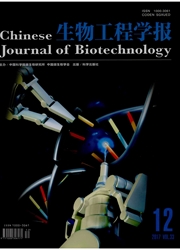

 中文摘要:
中文摘要:
为构建一种敏感性强、特异性好的检测砷离子的大肠杆菌荧光报告菌株,本研究利用基因敲除技术,敲除了大肠杆菌中负责向胞外转运砷离子的ars B基因,构建对As3+敏感的菌株;利用egfp基因作为报告基因,构建融合检测载体p ET28b-Pars-ars R-egfp。然后将检测载体p ET28b-Pars-ars R-egfp转化至ars B基因敲除菌中完成敏感型As3+检测菌株的构建。接着对此微生物传感器进行了检测条件的优化,以及线性检测范围、最低检出限、特异性等性能的确定。研究结果表明,与利用野生大肠杆菌作为检测宿主相比,此敏感型砷检测菌株对检测As3+的灵敏度有显著提高,最适检测As3+浓度范围为0.013-42.71μmol/L,最低检出下限为5.13 nmol/L。因此,本研究利用基因敲除技术对大肠杆菌进行改造,成功地提高了砷检测微生物传感器的灵敏度,为重金属微生物传感器的优化研究工作提供了有用方案。
 英文摘要:
英文摘要:
In order to construct an Escherichia coli strain with high sensitivity and specificity to detect arsenic ion using fluorescence as reporter,a sensitive strain to arsenic ion was obtained by knocking out the gene ars B that acts as an arsenic efflux pump.The p ET28 b vector containing arsenite detecting cassette Pars-ars R-egfp was constructed and then transformed into ars B deleted mutant.Measuring conditions of this constructed whole-cell biosensor were optimized and its linear concentration range,limit of detection and specificity were determined.This modified biosensor was much more sensitive than that using wild-type strain as host.The optimal detection range of As3+ concentration was 0.013 to 42.71 μmol/L,and the limit concentration of detection was as low as 5.13 nmol/L.Thus we successfully improved the sensitivity of arsenite detecting biosensor by modification of E.coli genome,which may provide useful strategies for development and optimization of microbial sensors to detect heavy metals.
 同期刊论文项目
同期刊论文项目
 同项目期刊论文
同项目期刊论文
 期刊信息
期刊信息
